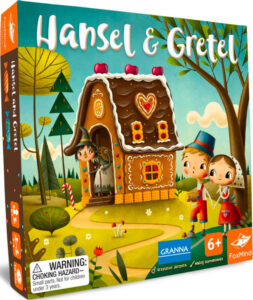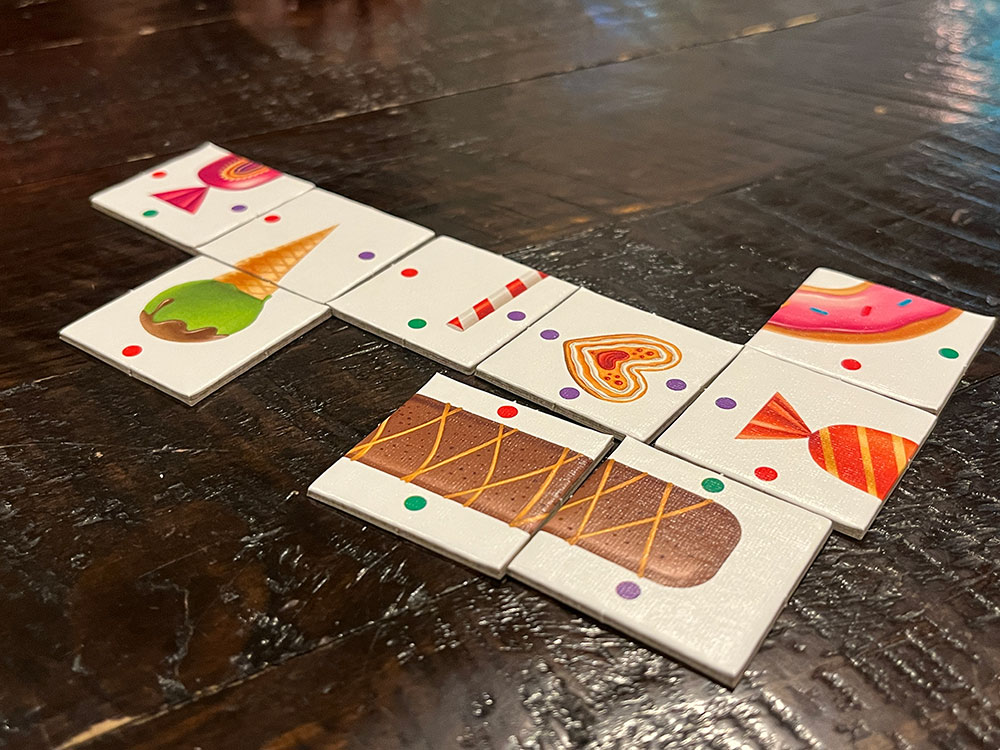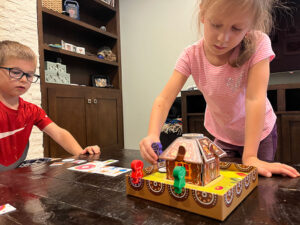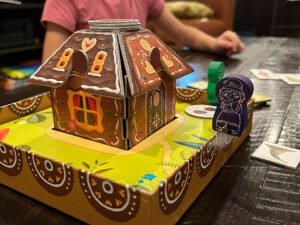 I’ve been slowly digging my way through the pile of games I got from Gen Con to review this year, and lucky for my kids, a good number of them were family games. They love gaming with me so I’m always looking for something new to introduce them to. After meeting with family game publisher Foxmind, we had a delicious-looking game to try out.
I’ve been slowly digging my way through the pile of games I got from Gen Con to review this year, and lucky for my kids, a good number of them were family games. They love gaming with me so I’m always looking for something new to introduce them to. After meeting with family game publisher Foxmind, we had a delicious-looking game to try out.
Hansel and Gretel, a cooperative game based on the familiar fable, tasks players with escaping from the evil witch that wants to eat them. The box says it’s appropriate for kids ages 6+, but I can safely say that my twin 5-year-olds handled it with no issues.
Gameplay Overview:
The goal in Hansel and Gretel is to collect 5 gingerbread tokens from the top of the house. Each turn, a player will play one of their tiles into the tableau in the center of the table. The goal is to complete pictures of different kinds of desserts. Completing one will earn the players a gingerbread token, which can also be spent for a 1-time movement bonus. At the end of their turn, the player draws a new tile. However, if the new tile is a witch’s hat, she gets a free move action. So watch out on that one.
At the end of each round, Hansel, Gretel, and the Witch will move around the track on the box. Each figure will move a number of spaces equal to the colored dots shown on the edge of the tableau. So if you can count 5 purple dots on the exterior of the tile formation, the Witch will move 5 spaces.
If the witch ever catches up to Hansel or Gretel (or if they lap around and catch her), the players lose and are, presumably, eaten. If they manage to claim all 5 gingerbread tiles first, they win!

Game Experience:
One thing Hansel and Gretel has going for it is its excellent production values. My kids absolutely loved the chunky, wooden Meeples, and the 3D gingerbread house that sits in the middle of the board. Thankfully, the house is super simple to assemble, requiring only for it to be folded down and the roof placed on top.

For the actual gameplay, I thought it was really clever. My kids quickly picked up on the fact that they both wanted to match candy shapes (which they are super excited to do) and also try and keep the purple dots out of the outside of the tableau. However, they were so focused on that for our first game that they ended up catching the witch, causing us to lose.
It’s an interesting balancing act of wanting the witch to move, but not enough to catch your players. So you have 3 balls you need to juggle to keep everything in equilibrium. I suppose someone could math the placement of each tile, but when you’re with 5 year olds, things move pretty swiftly and you just go with the flow. Eventually though they were able to wrap their heads around the fact that they need some purple on the edges, so our strategy improved with more plays.

One of the great things about the game is that once you have a feel for it, it includes variants to make things easier or harder. I always appreciate when my cooperative games give me levers to pull to adjust the difficulty. For Hansel and Gretel, you can make things harder by adding in special chocolate tiles, or easier by adding a tile that atomically gives you a gingerbread token when drawn.
Final Thoughts:
Hansel and Gretel was an all-around win at our gaming table. My kids loved playing it, and have asked repeatedly to play again. I kind of use that as a barometer for how good a family game is. I see if they ask to play it again right away, and if they ask to play it on their own… both of which they did. And from my perspective, I thought the game was actually pretty fun. While it’s not something I’m going to pull out with my gaming group, I enjoyed playing it with the kiddos. It was a nice break from the constant barrage of memory or completely random games aimed at their age group. If you are looking for something new to play with your little ones, Hasnel and Gretel is a great option!
Source: Board Game Quest





